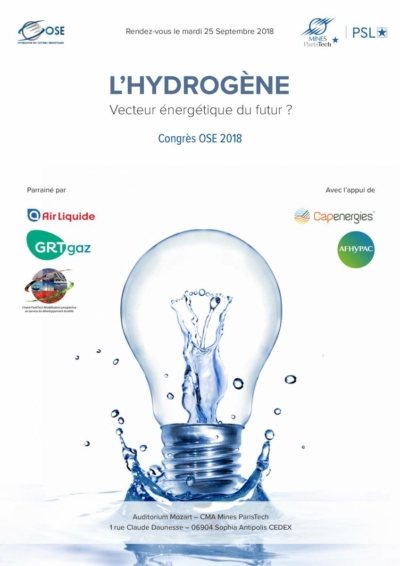Hydrogen: the energy vector of the future ?
Tuesday, Septembre 25th 2018 – from 9am to 5pm – MINES ParisTech, Sophia Antipolis, Mozart Amphitheatre
Event sponsored by AIR LIQUIDE, GRTgaz and the Chair MPDD, with the support of Capenergies and of AFHYPAC
 Nowadays, hydrogen is solely produced through industrial-orientated processes in the chemical and oil sectors. Among the 60 million tons consummed each year – accounting for less than than 2% of the global energy consumption, hydrogen is mostly used during the refining of oil and as raw material in the fabrication of ammoniac. As it does not exist in its pure state, hydrogen is not an energy source but an energy vector because it transports energy. If its production was decarbonized, unlike the processes used today in the chemical and oil industries, this energy vector would have a real added value in many different fields. Indeed, its principal applications use the fuel cell technology, which only rejects water. Once produced, this energy vector allows for a entirely decarbonized use of energy, which complies perfectly with the requirements of the energy transition. Used in the transport and storage sectors, hydrogen could become the energy vector of the future. Moreover, it offers possibities for flexibility, notably with power-to-gas. Power-to-gas is about transforming the intermittent renewable electricity surplus into green gas in order to store it. Indeed, electricity is converted into hydrogene through water elecctrolysis. Hydrogen can then be combined to carbon dioxide (CO2) through a methanation process in order to obtain synthetic methane whose properties are identical to that of natural gas, meaning that it can be injected in the gas transportation network. The decentralized production of electricity being more and more sought-after, hydrogen seems to be an element worth taking into account, whether in a macrosystemic approach or in an ecosystemic one.
Nowadays, hydrogen is solely produced through industrial-orientated processes in the chemical and oil sectors. Among the 60 million tons consummed each year – accounting for less than than 2% of the global energy consumption, hydrogen is mostly used during the refining of oil and as raw material in the fabrication of ammoniac. As it does not exist in its pure state, hydrogen is not an energy source but an energy vector because it transports energy. If its production was decarbonized, unlike the processes used today in the chemical and oil industries, this energy vector would have a real added value in many different fields. Indeed, its principal applications use the fuel cell technology, which only rejects water. Once produced, this energy vector allows for a entirely decarbonized use of energy, which complies perfectly with the requirements of the energy transition. Used in the transport and storage sectors, hydrogen could become the energy vector of the future. Moreover, it offers possibities for flexibility, notably with power-to-gas. Power-to-gas is about transforming the intermittent renewable electricity surplus into green gas in order to store it. Indeed, electricity is converted into hydrogene through water elecctrolysis. Hydrogen can then be combined to carbon dioxide (CO2) through a methanation process in order to obtain synthetic methane whose properties are identical to that of natural gas, meaning that it can be injected in the gas transportation network. The decentralized production of electricity being more and more sought-after, hydrogen seems to be an element worth taking into account, whether in a macrosystemic approach or in an ecosystemic one.
This event will be hosted by the students of the Advanced Master OSE.
Image credit: © Mastère OSE
Understanding the COP21 and beyond
A conference co-organized by IDDRI, the CIRED and EDF June 15th 2016, from 2pm to 4pm, [...]
68th International ETSAP Workshop
Image credit: © IEA-ETSAP October 22nd and 23rd 2015 - Centre for Applied Mathematics , MINES [...]
15th Chair MPDD Conference – Advanced Master OSE (Optimization of Energy Systems)
Contributions to the preparation of the COP21: sectoral, regional and individual issues Tuesday, September 22nd 2015 from 9am [...]
Modeling the city to cope with climate change
Evaluation of policies to reduce CO2 emissions - Analysis of vulnerability to heatwaves (ANR VURCA project) October 16th [...]



